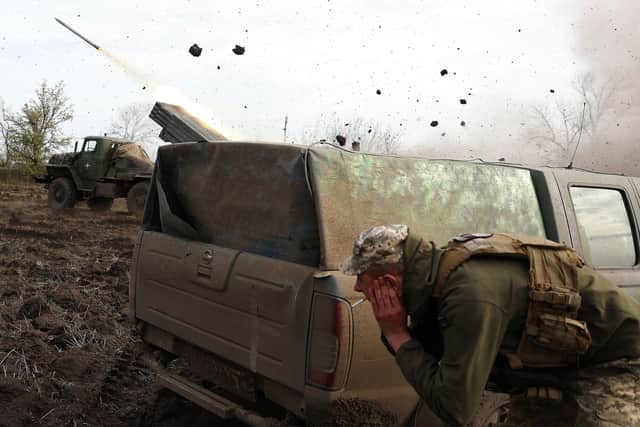Russia's war on Ukraine: President Volodymyr Zelensky has just six months to win the war for the West – Professor Tim Willasey-Wilsey
Nato secretary-general Jens Stoltenberg sounded reassuringly robust when he declared last week that all the alliance’s members “have agreed that Ukraine will become a member” but he omitted to mention a timeframe. The German defence minister, Boris Pistorius, dampened any elation with the words “the door is open a crack, but this is not the time to decide now”.
President Zelensky possesses finely tuned antennae. He knows that the United States and Europe are tiring of the war in Ukraine and are anxious about its economic and political effects in their own countries. The West is also running short of munitions. The United States, which has provided 75 per cent of the military hardware for Ukraine’s defence against the Russian invasion, is shortly to enter another electoral cycle when President Joe Biden (or a new Democrat candidate) does not want to defend an expensive war against a resurgent Donald Trump or the younger and more dynamic Ron DeSantis. Ideally, Biden will want the war finished by the end of 2023 before the US primaries begin in early 2024. Working backwards, that means peace or ceasefire negotiations between November 2023 and February 2024 when the fighting will have stopped for the winter.
Advertisement
Hide AdAdvertisement
Hide AdAssuming that the spring offensives will begin in the next few weeks, that gives Ukraine six months to win the war. This will be hard to achieve since attacking is more difficult than defending. Furthermore, its allies have equipped Ukraine for a defensive war. Even if all the promised Leopard 2 tanks arrive in time, there are not enough to punch a hole in Russian defences and exploit the opening as espoused by generals like Heinz Guderian or Georgy Zhukov. And the allies have not provided Ukraine with the air power to support such an offensive. Zelensky’s pleas for F-16s have been met with marked reluctance by most Nato members.
Meanwhile, Putin has been working effectively to spread the dispute further afield. The West should be concerned by recent events in Moldova, Georgia and Belarus. Putin’s foreign policy statement on March 31 declared: “The Russian Federation intends to eliminate the worldwide dominance of the United States and other unfriendly countries.” His alliance with China seems firmer after Xi Jinping’s recent visit to Moscow. India is importing more Russian oil than before. President Lula of Brazil has questioned the role of Nato expansion in causing the war. In fact, Putin is achieving more with his wartime diplomacy than his troops on the battlefield.
It is still possible that Ukraine can win the war. A sudden collapse of Russian morale would be understandable given their heavy casualties, poor equipment, awful living conditions and the incompetence of their leadership. However, the greater probability is that the front lines in October 2023 will not be much different to now. This is when French President Emmanuel Macron, supported by the German Chancellor, Olaf Scholz, will ramp up the pressure for a “negotiated solution”.
However, even a vaguely acceptable settlement will be hard to achieve. The demandeur will be seen to be Ukraine and so, from the outset, Putin will see no need to make any concessions. He will also be interested in delaying to see if Trump or DeSantis wins the US presidential election and whether he can get a better deal from them, remembering Trump’s lamentably inept Doha Agreement with the Taliban.
As a start, Putin is likely to demand that Ukraine surrenders all of the Donbas to Russia, that Russia’s possession of the Crimea should be recognised internationally and that all of its frozen assets are returned. He will, of course, reject any notion of war crimes tribunals and reparations.


Quite how Macron, Scholz and Biden expect to shift Putin from this position is hard to see. The West has very few levers to pull other than continuing the economic sanctions which Russia has successfully weathered for over a year. Putin would not accept Nato membership for Ukraine and would doubtless threaten to restart the war if the West pushed the point. It is hard to see either Macron or Scholz holding firm on Nato membership.
All this spells danger for Biden. A bad peace deal might do him more damage than an ongoing war. Following Macron’s craven trip to China, the US president should be wary of hitching his wagon to a French president who is both unreliable and apparently focussed on a Ukraine peace as his legacy achievement. A wary Biden might also ponder Germany’s position on Ukraine and Russia, where policy opaqueness has a history reaching back to the Treaty of Rapallo in 1922. Scholz’s seemingly tough response following Putin’s invasion last year looks less apparent now following Germany’s foot-dragging on the Leopard 2 tanks and the closure of its nuclear power plants.
Above all, without Nato membership, it is hard to see any means of preventing Russia from attacking Ukraine in future. This would condemn Eastern Europe to decades of instability and would alarm the Baltic States and Russia’s neighbours. Another western foreign policy failure on this scale would encourage more and more countries to hedge their bets as China becomes the alternative pole of global power. It seems altogether unjust that Zelensky and Ukraine are having to fight for the future of Western global credibility.
Tim Willasey-Wilsey is visiting professor of War Studies at King’s College, London and senior associate fellow at the Royal United Services Institute (Rusi). He is a former senior British diplomat.
Comments
Want to join the conversation? Please or to comment on this article.